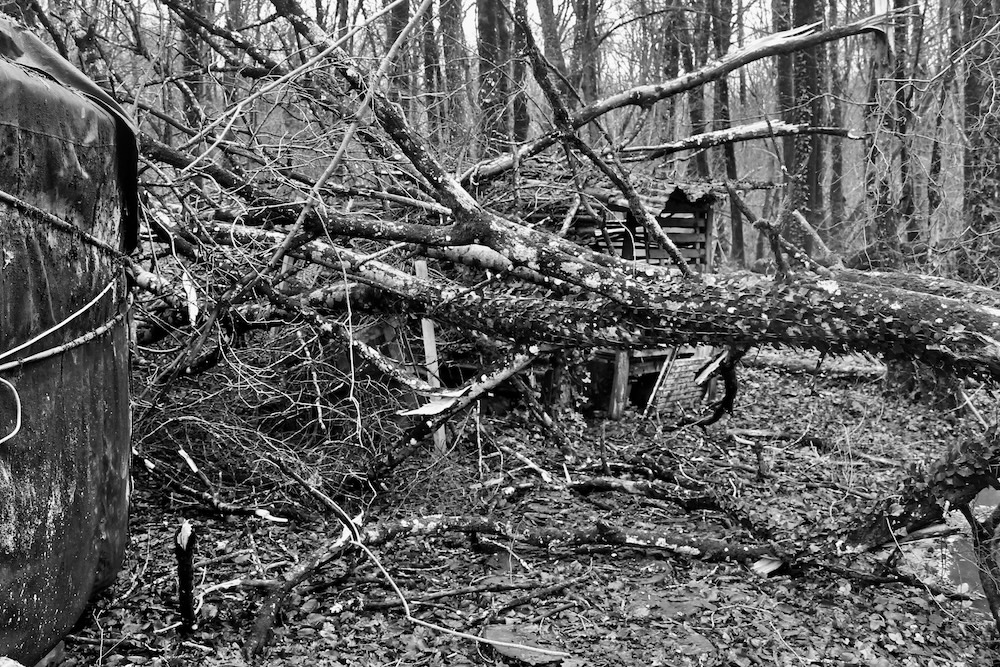Slugs in the cupboards, slugs in the bed: Dexter Petley, member of the quagmire gentry, reflects on a a swell year to take a home off the map.
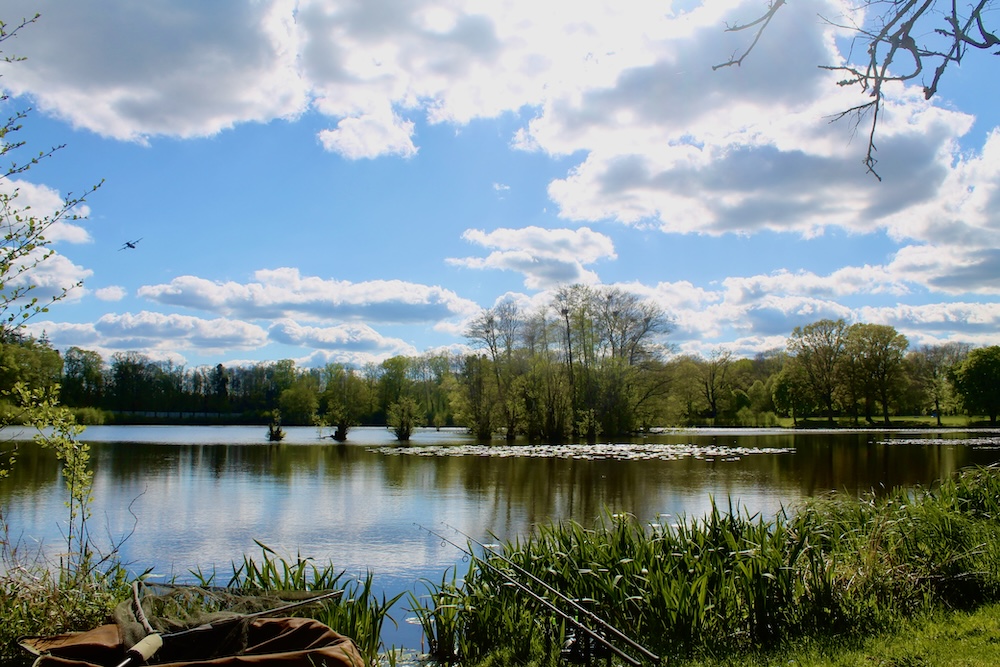
The apples were sour, hops had no smell. The mud didn’t dry, fish hardly bit. There were slugs in the cupboards, slugs in the bed. No swallows, no bats, rotten tomatoes, a plague on all our greenhouses. The whole history of sunless mud rolled into one year, mud thick as the two short planks I had to walk upon, even in summer. Then, just as the ground was evening out, wild boar in squadrons, carpet bombs, craters of mud I didn’t know were there pooled up among the mole hills and wheelbarrow ruts and sunken boot prints. That was August, so augustine.
As a member of the quagmire gentry, landed of no fixed abode, only horse-hair rope fixing me to earth, I found much purpose to it all, a swell year to take a home off the map. My lifeline these past 20 years has been a rented barn nearby, dry storage, book zero and paper-worm zoo, a water tap, electricity for the freezer. The landlord, whose ancestors’ names are among the fallen, ceux de 14 remembered on a calvaire just down the lane, decided to sell off the family farm, giving me till April fools next year. Where to, the mounds of collected clobber? What for, the books and brickbats, the boxes of letters since 1976, the unpublished manuscripts 1973-1993, the carbon copy flimsies of a life wasted writing, their only fate mud and mice? The yurt is for belonging, not belongings. The sheds I stack the wood, not Wodwo or Wordsworth. I have no Brod, nor Mill, Hughes, Colonel Doyle or executrix to strike the match upon my word, so I made a bonfire of all these vanities myself. Farewell the past in glorious plumes of smoke. Bibliocide for beginners. All the jejune juvenilia up its own chimney, no doubt from whence it came. The 70s scorched, the flaming 80s, fried 90s, a million words in crematorium which once burnt to be let out so. Next came the million processed words, electric interregnum, floppy discs and Apple hardware, original sin that apple too — the actual writing career, beaten by hammer into aircraft pieces, driven off to be down-soldered, unfluxed, an ethereal past but just as irredeemable once gone. These, not a question of worldly space, are the former selves who thought they knew best, hangers-on who steal your moments from under your nose. You read them back instead of memory, still fooled until you fire them all and it’s a clean sweep, life without the evidence. There’s nothing like it, no stuff to come back, no relapse or old testament misery. For the rest, the three-dimensional goods, the preservation of what I am, there is the fishing tackle, only that which I use. Up went a tin shed under the trees, 6ft x 3ft, a Noah’s Ark if you like. It all fitted in like a bottom drawer, inflatable boats and all. Beside it, under the trees, a polytunnel for the tools, the bike and mowers. In the sale of half a century, everything went.
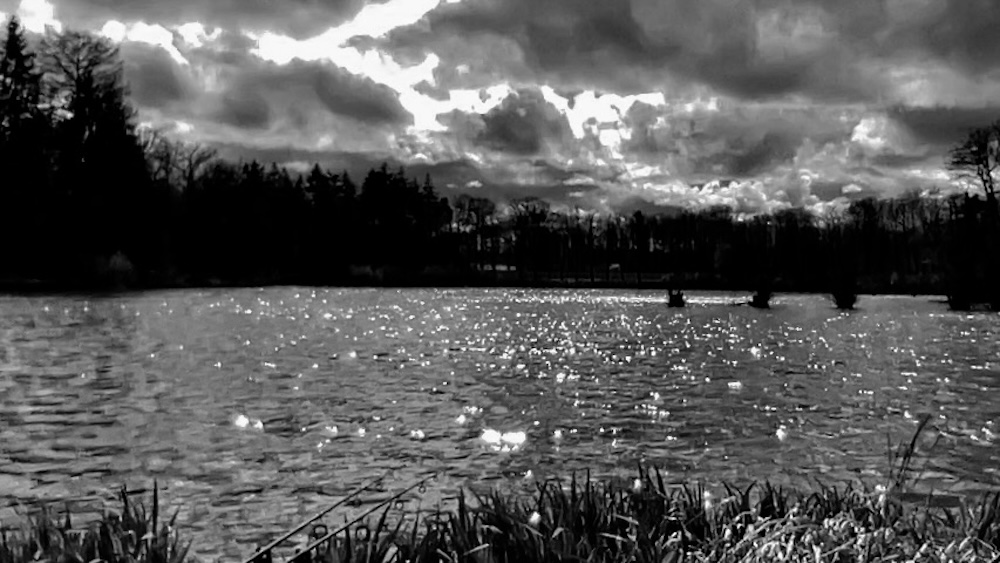
Throughout this decommissioning, the camper van, semi-derelict and stationary, which by now ought to be indoors drained of all its water and gas, washed and vacuumed, sat outside in long wet grass, tiny leaks running inside the cab, the fridge mouldy, cobwebs over the galley. A getaway car outside the wrong bank, going nowhere since January, still on standby for a trip to fish the Seine, as the clocks changed to winter, the mists settled down and Guy Fawkes came and went. On fell the rain, the lines the only dry eye in the house. My last carp was caught in August, an afternoon during the one heatwave of the year. Languid fish under cypress trees, lily pad lubbers half asleep, punchers on a good day.
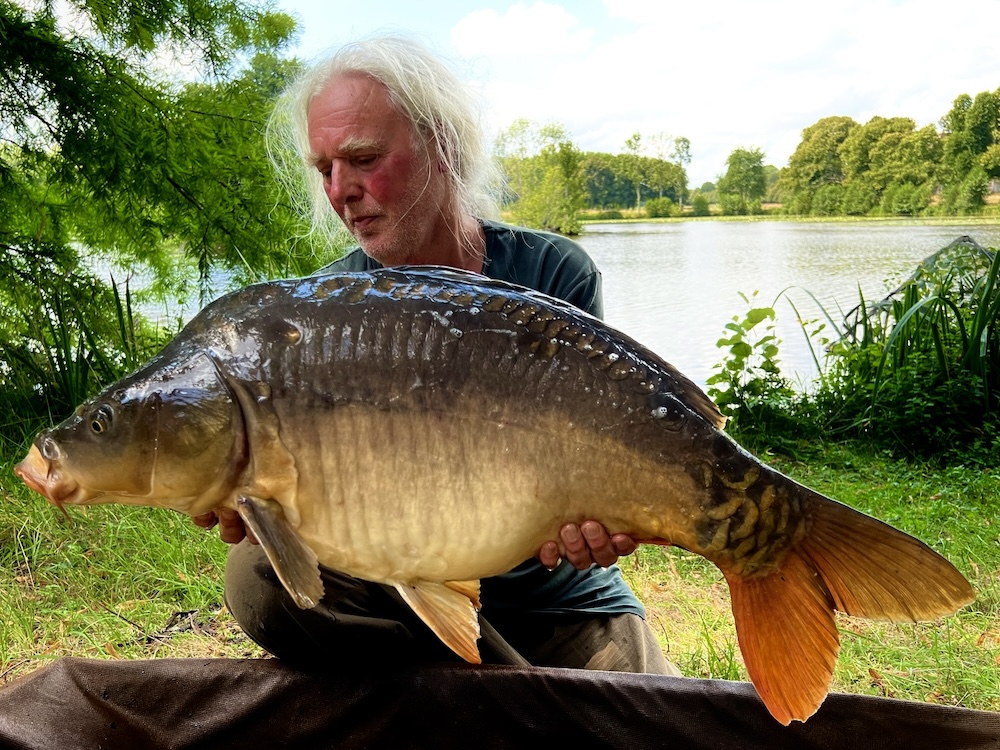
The Seine in November emasculates that halcyon moodiness, more like camping in a flooded scrapyard. It had stopped raining, finally, on Remembrance Day weekend. Wheat plain villages in hunter’s fog, all the inflatable Santas lit up and patched. The van was on a dirt road under a row of trees. A village green grazed by geese, empty jetties, fallen conkers. A wide view across the river to an old café, once a meeting place of bargees two centuries ago, the port now brambled over. A gap hardly wide enough for rods, sand and worn gravel, pea mussels and old plates, the very spot where, in the 1880s, Monet stood and painted. His was a treeless Seine of punts, ladies in bonnets, pale blue dresses, parasols and sunlight on the cow pasture. They kept it cleaner then, with towpaths for the barge horse, poplar trees on the islands, guinguettes where wine was served with croissants, poppy fields and gardens full of sweet peas. Now there’s a terrible scruffiness, a brash jungle of twisted willows, bramble in the gravel, crudely shored up banks and all that plastic snagged in the branches after a flood. It is the best there is, but it was ugly. Monet’s riverside villas are second homes, shuttered windows and unkempt yards. Old walls and sports cars. After dark, the surface is flat and oily, orange lamps like Monet’s flowers on the water. Under the bright moon, the camping car was like an old-fashioned fish and chip van once the heater was lit, vapour in the cold air outside like frying smoke from the chimney flue. Emails from friends out fishing too said they were as luckless as I that week. A sudden drop in temperature reminded me it was mid-November, time to head home before the snow.
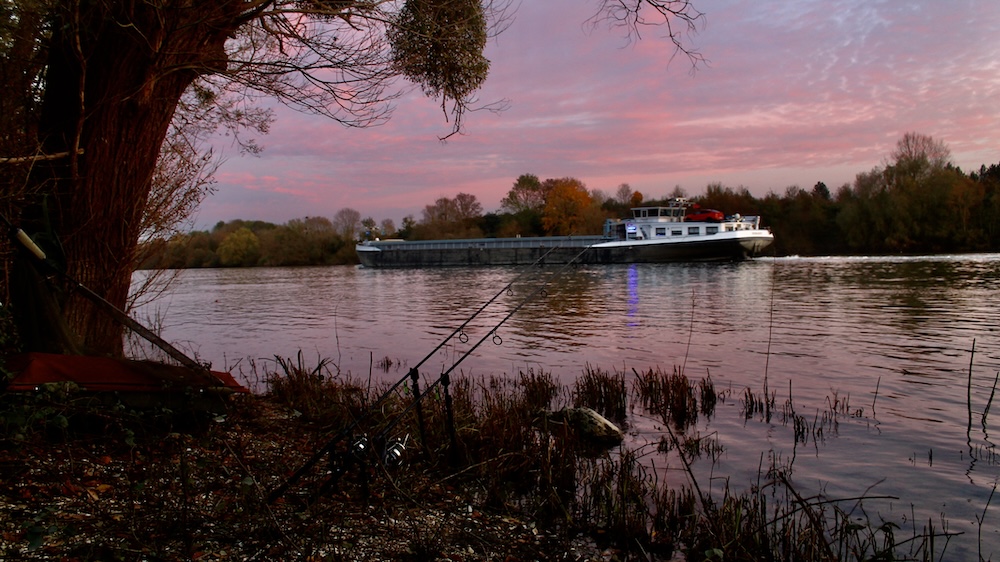
It was a photo finish. As I parked the camping car in its winter billet, the first thin flakes began to fall. By evening there was nothing left of the old landscape. On thick mud, a fat white snow like icing on a climate change cake, the winter wedding of the year, worth its weight in wind. All night the yurt roof boomed as its sentinel oak shook off snow balls. Big willows leaning over the track began to bow until they cracked and fell, or were they pushed? In the afternoon, through fat greasy flakes, I wheeled a barrow of logs between the thickening arches of branches, swelling as the flakes latched on. The biggest tree, not ten steps in front of me, seemed to swoon. As I stopped, it began to feint, lowered itself, like a suicide, so slow and gently tired of holding up the sky, until it came to rest on its crown. This snow was made of shavings from a leaden sky, so heavy that bushes and brambles, once eight feet high, were flattened. They, in turn, brought down the cables from my solar station, pulling them apart. When the power snapped off at midnight, I hunted for the ends, up to my waist in drift, cables hanging from trees now thick as ship’s rope, the head torch catching a trace of hare, a badger, even a bullock, all probably as flustered by this arctic pounding as I. In the morning, I counted the setbacks, the forest creaking like the Cutty Sark at sea, split boughs and rigging twisted, the scene like an ink sketch on blotting paper, the whole fleet in mothballs.
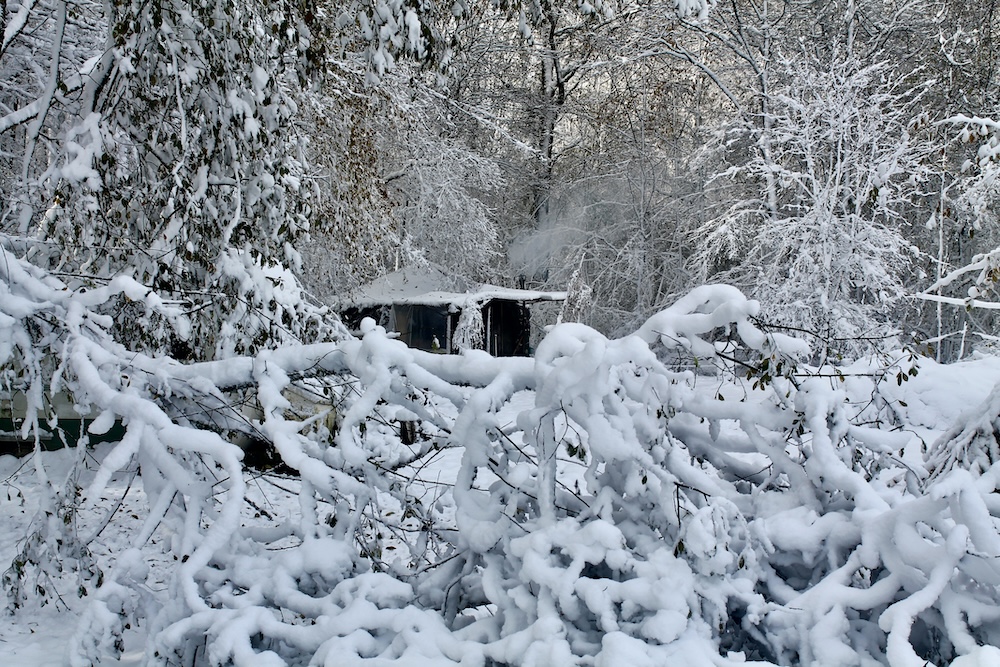
The year ends patching up the damage, twelve consecutive months on storm alerts, shoring up, slopping out until another air raid puts out the lights. This December a tall aspen keeled as I watched, dropping quite miraculously into an eight foot gap between the yurt and toilet shed, my sentinel oak parrying the branch which would otherwise have smashed the yurt to matchsticks over the bed. Fleeing with hastily grabbed essentials, Sunday was spent flinching in the camping car, rudely hauled from winter dry dock, until the yurt was safe again. The sun, if it does appear, is sly and low, its rays uncatchable as it flits from shadow to shadow behind trees, never once peeking over the top. I chase it to the far top corner of the field, among a thousand oak saplings which for now cast neither shadow nor fear. Fishing for electricity, sun-scrumping, I put down mobile panels hooked up to power packs, moving them every hour till we hit the brambles and the wild willows as the afternoons pull up their draws. I wire a panel to the Land Rover roof rack, go shopping for amp hours. The catch is meagre, enough juice to run the wi-fi and fill the laptop for another day or two. In the meantime, the power station has had to be dismantled, reconfigured for the dead months of November to February. A goat willow, 60 yards out into scrub, seemed to catch the midday sun and retain a glow, enough to turn a soup whisk and play a record. The tree is half candelabra, half cupped hand, almost 30ft high. It seemed the only solution, lop it into a panel rig, watts without tears, a curious statue of liberty, egality, autonomy, both shadow and reflection. A good place, it seemed to me, to end another year which made a great deal of nothing.
